Tech
20 Best ChatGPT Chrome Extensions for Digital Marketers and SEO Professionals
(CTN News) – ChatGPT has revolutionized how we tackle daily digital marketing and SEO tasks. To maximize its potential, using Chrome extensions specifically designed for ChatGPT is a game-changer.
However, with the constant emergence of new tools, it can be challenging to keep up. To make things easier, I have curated a list of 20 top ChatGPT Chrome extensions for you to try.
These extensions will enhance ChatGPT’s capabilities and help you improve your efficiency and productivity. Let’s dive in!
1. ChatGPT For Google
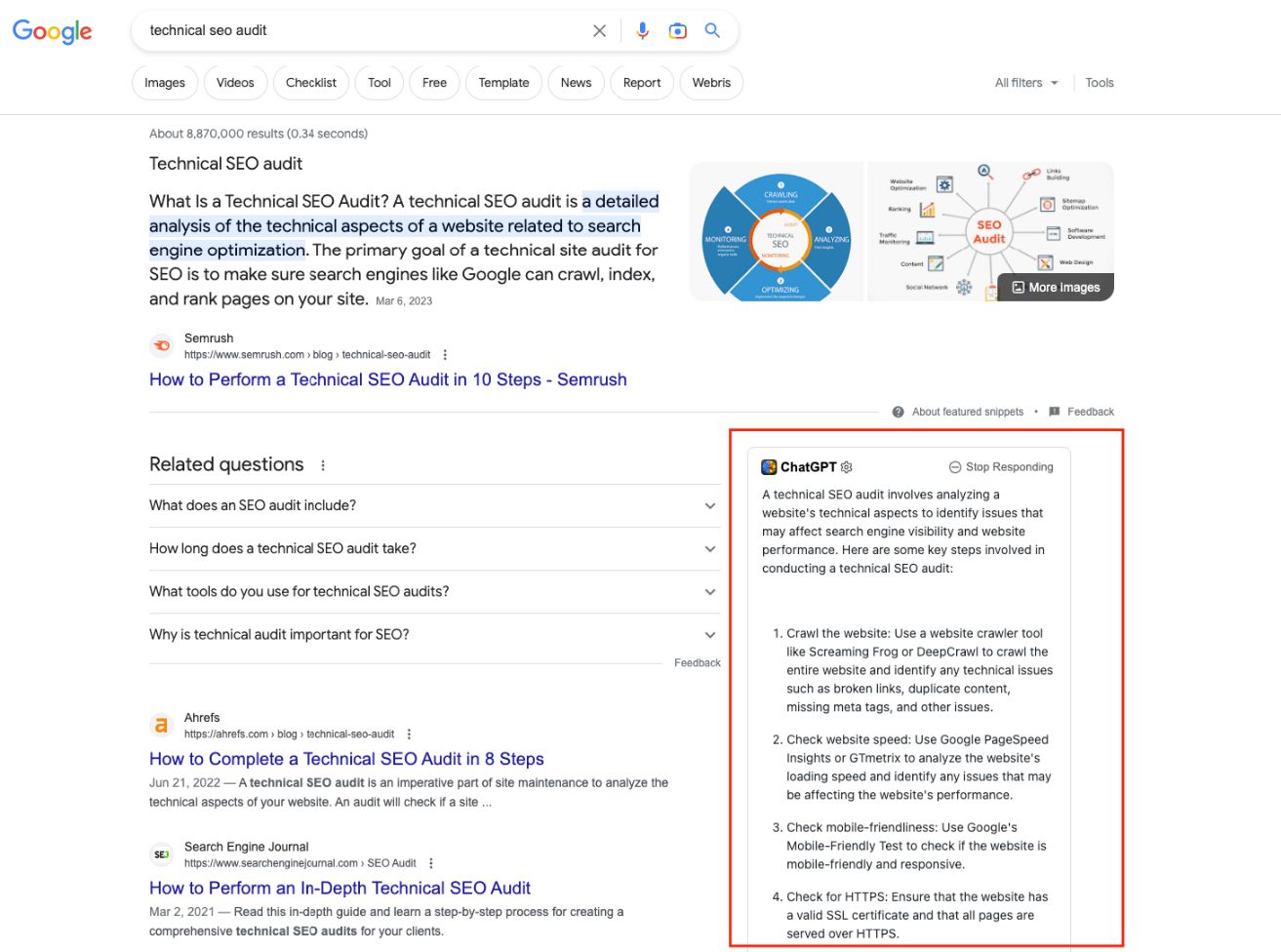
ChatGPT for Google displays ChatGPT’s replies right next to search results from popular engines like Google, Bing, and DuckDuckGo. You can chat with ChatGPT about the query and receive answers.
It also features a dark mode, markdown rendering, code highlights, and custom trigger mode. As a bonus, it supports ChatGPT Plus and GPT-4 (manual enable needed) and provides a way to give feedback for ChatGPT improvements.
2. WebChatGPT
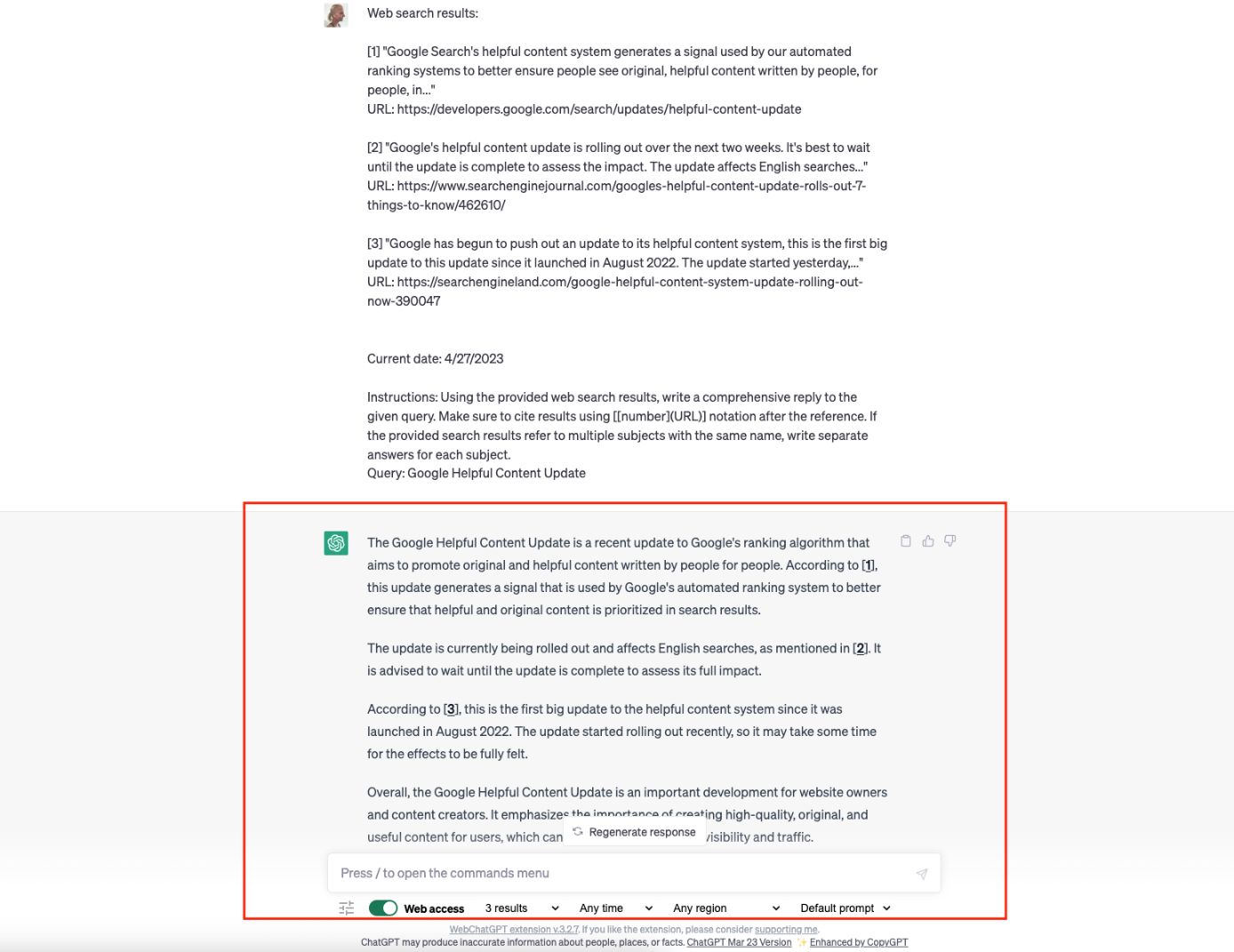
WebChatGPT overcomes ChatGPT’s limitation of being based on knowledge up to 2021. This extension adds relevant web results to the prompts, ensuring conversations are accurate and up-to-date.
It allows you to get web results for your queries and extract webpage text from any URL. The additional prompt templates and use of DuckDuckGo bangs help in obtaining precise search results from thousands of websites.
3. Promptheus
Promptheus transforms ChatGPT into a voice assistant by enabling input through a microphone. By holding the spacebar, you can talk to ChatGPT instead of typing, leading to faster and more fluid conversations.
Language options can be customized in the top-right corner by clicking “Promptheus Options.” Prometheus enhances your ChatGPT experience by making it more engaging and efficient.
4. TweetGPT
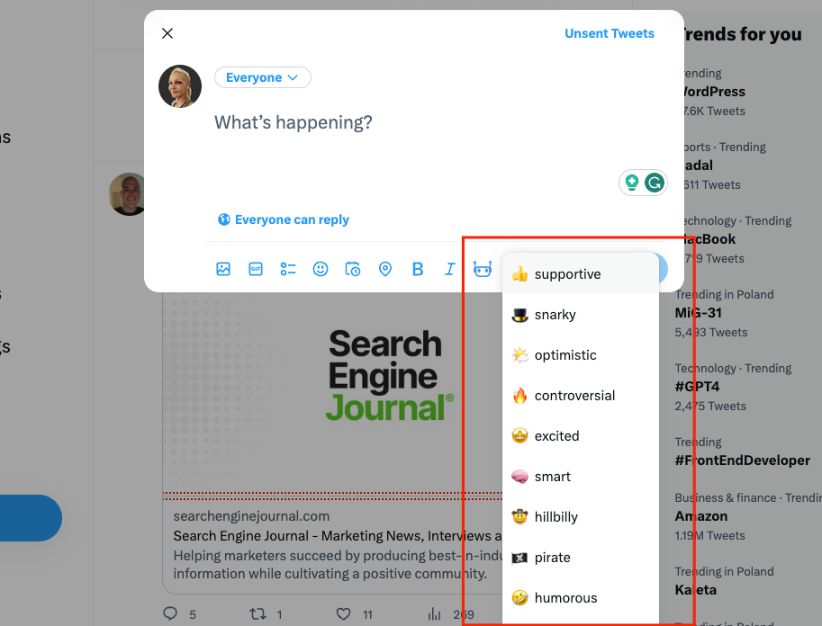
TweetGPT integrates ChatGPT into Twitter, helping you create thoughtful tweets or respond to others with engaging content. By utilizing ChatGPT’s API, you can generate personalized tweets that resonate with your audience and spark conversations.
Choose your preferred topic, language, and emotional tone, and let TweetGPT do the rest. However, it’s recommended to moderate the tool’s output to maintain your Twitter reputation.
5. ChatGPT Writer
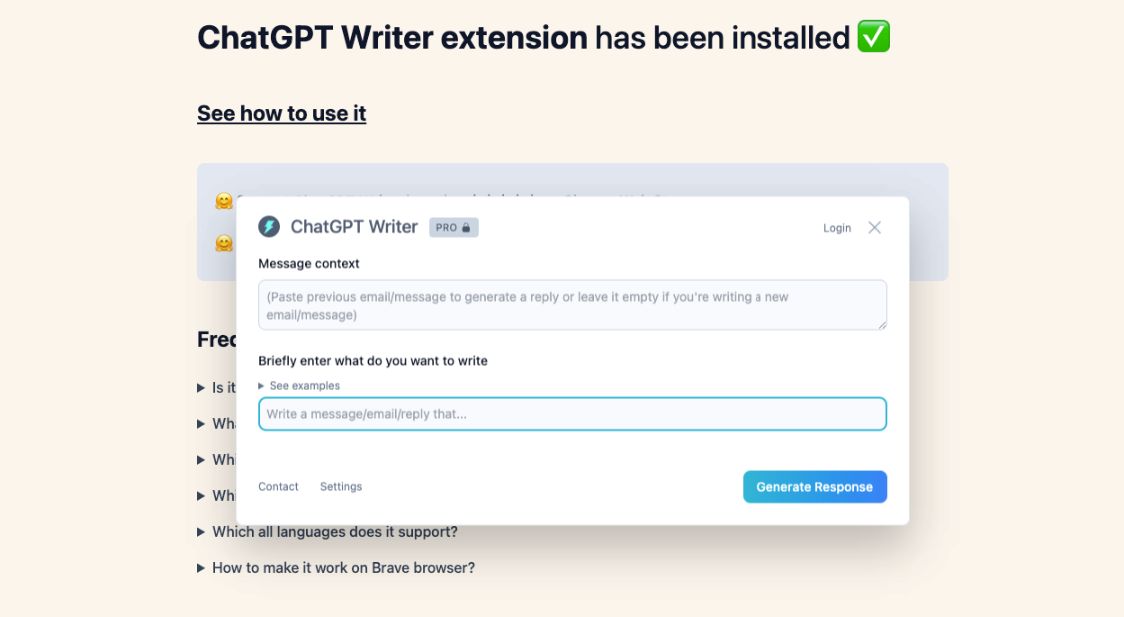
ChatGPT Writer allows you to leverage ChatGPT’s capabilities to craft emails and messages on any website. This standalone extension only requires an OpenAI login to deliver high-quality responses that often outperform other tools.
It works on all Chromium-based browsers, supports all languages, and provides enhanced support for Gmail, making it a valuable tool for writing content.
6. ChatGPT For Chrome
ChatGPT for Chrome enhances your search experience by displaying ChatGPT’s responses alongside search engine results from Google, Bing, and other search engines.
This free and convenient extension enables you to access ChatGPT’s advanced AI capabilities directly from your Chrome browser.
Key features include code highlights for easy understanding, a dark mode for comfortable viewing, and a clipboard copy option for pasting information elsewhere.
7. Wiseone
Wiseone is an AI-powered reading co-pilot that simplifies your online reading experience by integrating directly into the browser window and recognizing all text types.
It automatically reads complex parts and breaks them down for easier understanding. The extension’s features, including Discover, Cross-checking, Ask Anything, Summarize, and Suggestions, transform how you read and explore information online.
Wiseone helps you better comprehend complex concepts and verifies facts using multiple sources.
8. Merlin
Merlin is an amazing ChatGPT extension that works across your entire browser. By clicking Cmd+M, you can access ChatGPT on any website, from Google to Gmail and beyond.
It’s free and prioritizes privacy, saving you time with features like summarizing YouTube videos, generating email responses, and creating AI-driven social engagement on platforms like Twitter and LinkedIn.
9. ChatGPT Prompt Genius
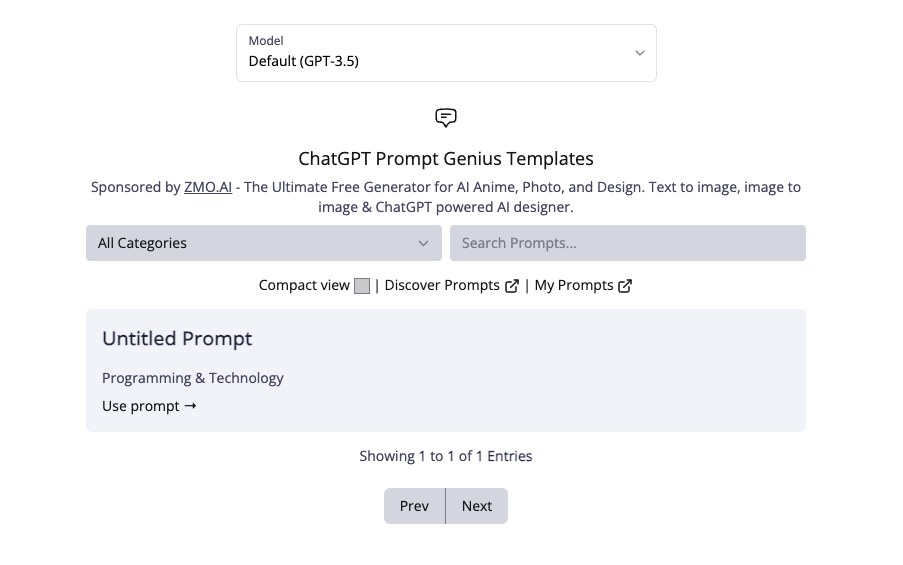
ChatGPT Prompt Genius is a free and open-source browser extension designed to provide an extensive library of prompts, customization options, and additional features.
With this extension, you can easily discover, share, import, and use the best prompts for ChatGPT while syncing your chat history locally for easy access and searching.
You can export your chats in various formats such as markdown, HTML, PDF, or PNG and enhance your ChatGPT experience with customizable themes like SMS, cozy fireplace, and hacker.
It also allows you to explore and bookmark threads, search through threads and prompt templates, and provide feedback or suggestions through the built-in feedback form.
10. Engage AI
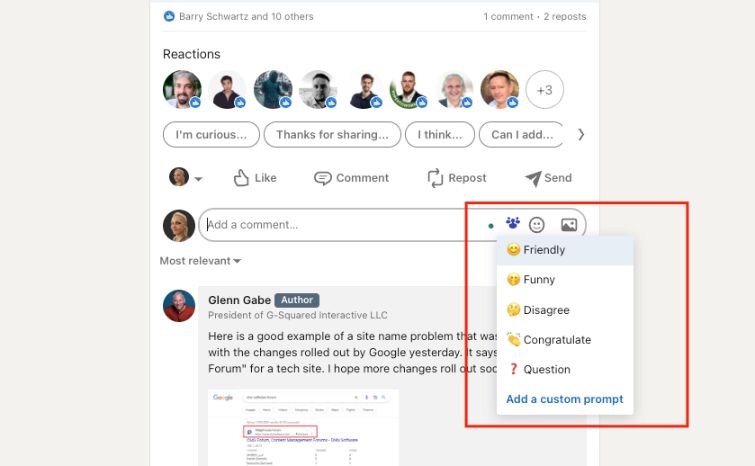
Engage AI is a ChatGPT Chrome extension specifically designed to help you write insightful LinkedIn comments, build relationships, and establish connections with prospects. It enables you to generate memorable, authentic, insightful, and relevant comments.
The extension offers various tone options, including friendly, funny, disagree, congratulate, and question, allowing you to tailor your engagements based on the specific context.
It’s recommended to proofread the tool’s output to ensure its accuracy and alignment with your intentions.
11. ChatGenie for ChatGPT
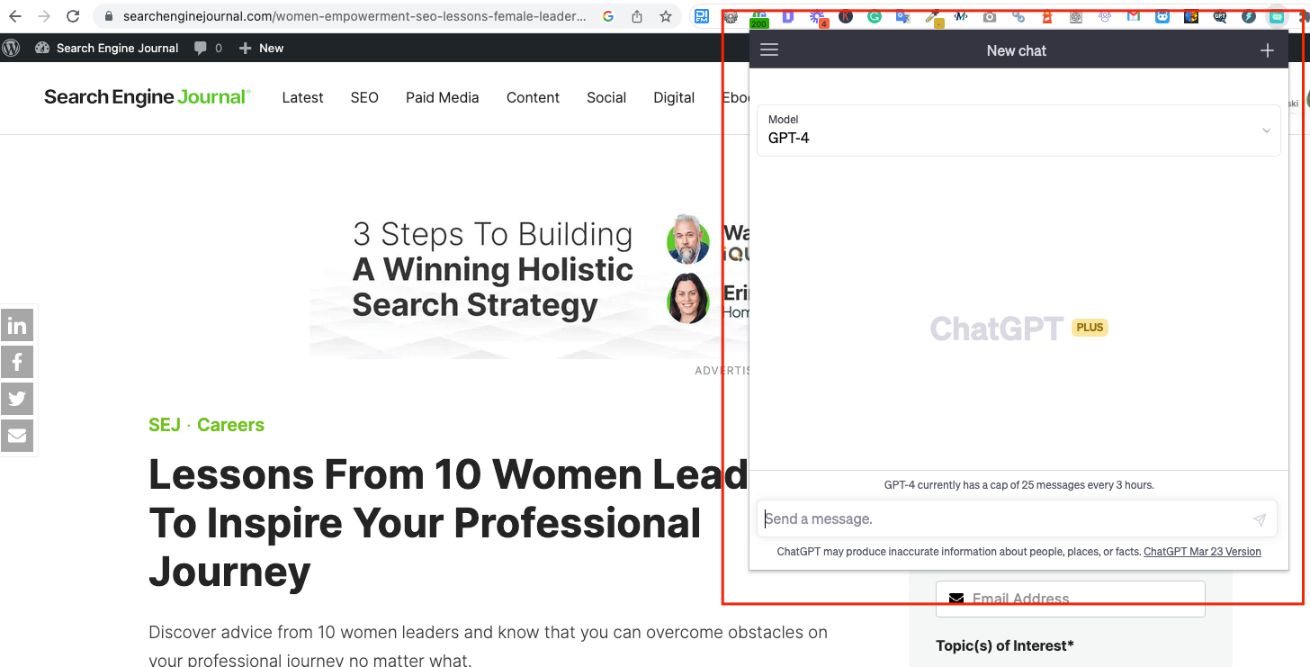
ChatGenie for ChatGPT is the ultimate browser extension that brings the power of OpenAI’s ChatGPT directly to your browsing experience. With ChatGenie, you can access ChatGPT with just a few clicks.
You can run ChatGPT from the context menu, quickly access ChatGPT through the navigation bar (Omnibox), and get answers directly from search result pages on popular search engines such as Google, Yahoo, Bing, DuckDuckGo, and more.
Additionally, ChatGenie maintains longer ChatGPT sessions by periodically pinging it.
12. YouTube & Article Summary Powered By ChatGPT
YouTube & Article Summary powered by ChatGPT is a free Chrome extension that harnesses the power of OpenAI’s ChatGPT to provide quick and accurate summaries of YouTube videos and articles across the web.
By clicking the summary button on the thumbnail of a video or article, you’ll get a concise summary of its contents.
The extension intelligently extracts key points and insights from the video or article’s transcript, allowing you to grasp the main ideas and concepts without having to watch or read the entire content.
13. Summary with ChatGPT – Open AI
Summary with ChatGPT is a versatile Chrome extension that utilizes OpenAI’s AI technology to offer clear and concise summaries of YouTube videos and articles.
It provides various features, including generating bullet point summaries for articles, customization of ChatGPT prompts, and support for both OpenAI API Key and ChatGPT login.
The extension also offers example prompts, such as summarizing an article in 3 bullet points or 50 words, translating text to Spanish, simplifying text for a 5-year-old, and writing a caption based on the content.
14. ChatSonic
ChatSonic is a powerful ChatGPT Chrome extension that allows you to enjoy the convenience of AI-assisted writing across various platforms like Gmail, Twitter, LinkedIn, Helpscout, and the web in general.
It enables you to compose emails, social media posts, support tickets, and more. The extension provides a wide range of writing templates covering categories such as marketing, sales, customer support, and personal productivity.
With its intuitive user interface, you can save your drafts, access your writing history, and benefit from multilingual support.
15. Talk-To-ChatGPT
Talk-To-ChatGPT is perfect for situations where you prefer not to type your queries. This extension enables you to talk to ChatGPT using your microphone, converting your speech to text and delivering AI-generated responses audibly.
It supports all major languages and is easy to use on the ChatGPT homepage. This feature simplifies your ChatGPT experience by leveraging Google Chrome’s speech recognition and text-to-speech technologies.
16. Copy For Chat GPT
Copying ChatGPT responses is made simple with Copy for Chat GPT. This extension adds a “Copy” button next to each response, allowing you to quickly copy the text without manual highlighting.
It also provides convenient keyboard shortcuts (CMD+K or CTRL+K) and runs the copied text through plagiarism detectors, alerting you to any potential issues. This ensures that your copied content is easily accessible and safe to use.
17. ReaderGPT
ReaderGPT can be a lifesaver for managing your online reading. It generates summaries of any text-based webpage using ChatGPT, helping you quickly grasp the main points of long articles or blog posts.
The extension offers a wide array of example prompts in the settings, allowing you to find the best way to summarize the content you’re interested in. With ReaderGPT, you can save time by focusing on the essential points of any article.
18. YouTubeDigest
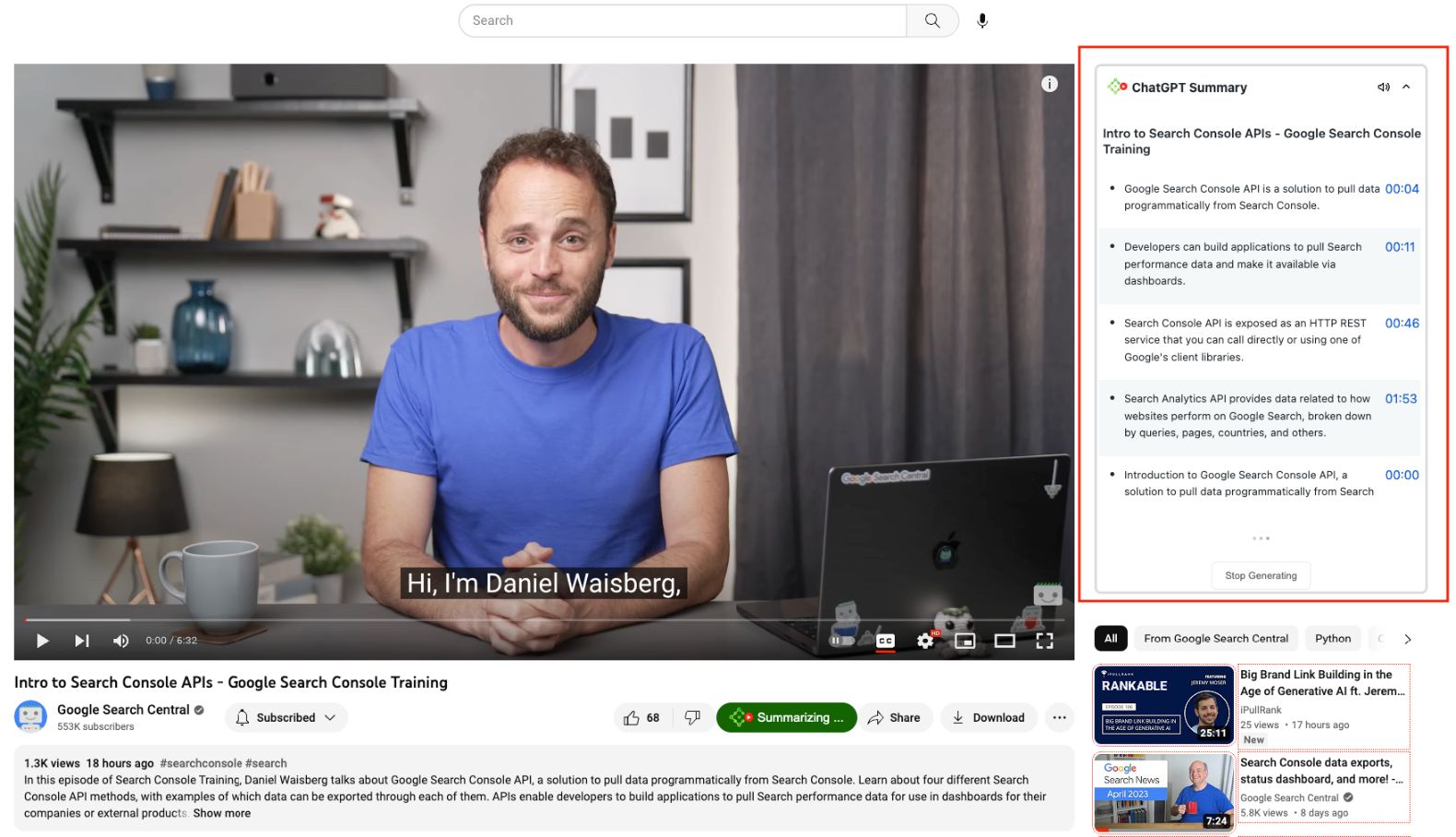
YouTubeDigest is a fantastic extension that leverages ChatGPT AI to generate summaries of YouTube videos using auto-generated transcriptions.
It provides multiple summary formats, including bullet points, paragraph summaries, and article-style overviews. You can even customize specific time ranges and translate content between languages.
The extension allows you to export your summaries as PDF, DOCX, or plain text for easy sharing and reference. This extension saves time and helps you preview video content before committing to watching the entire video.
19. Superpower ChatGPT
The Superpower ChatGPT extension adds numerous features to the ChatGPT app. It includes a continuously updated library of hundreds of prompts that can help ChatGPT act in various ways.
The extension offers chat management features such as folders and reordering, auto-sync, search and highlight, pinned messages, and group deletion.
It also provides prompt management features like input history, quick access, favorite prompts, search function, and community prompts. The extension covers language and style options, utilities like word and character count, model switching, copy mode, and more.
20. ShareGPT: Share Your ChatGPT Sessions
ShareGPT is an innovative extension allowing you to easily share your ChatGPT sessions. It generates a unique session link that captures the conversation history, including prompts, messages, and AI-generated responses.
By sharing the session link, you can collaborate, seek feedback, or simply share interesting conversations with friends and colleagues. This extension simplifies the process of sharing ChatGPT interactions and promotes collaboration and knowledge sharing.
conclusion
In conclusion, utilizing Chrome extensions designed for ChatGPT can greatly enhance your digital marketing and SEO tasks. These extensions offer improved efficiency, expanded capabilities, and seamless integration with your browsing experience.
Whether you need assistance with search results, content generation, social media engagement, or summarization, there are various extensions available to cater to your specific needs. By leveraging these tools, you can maximize the benefits of ChatGPT and streamline your workflow for greater productivity.

Tech
US: A Judge Mandates that Google Allow Competing App Stores to Access Android

(VOR News) – The ruling is that Google, the greatest technology firm in the world, is required to make its Android smartphone operating system available to merchants that supply applications that are in direct rivalry with Google’s. This decision was reached by a judge in the United States of America.
The Android Play store, which is owned and operated by Google, was found to be an example of an illegal monopoly arrangement by a jury in the state of California on Monday. The finding was reached by a jury. Monday is the day that this decision was come to.
An earlier federal judge ruled Google’s search engine illegal.
This finding, which came after that decision, has forced the company to suffer yet another setback. As a result of the corporation having already encountered its initial obstacle, this decision has been established. This particular decision was made by the judge during the month of August, when the month was in progress.
In light of the fact that the decision was made, what exactly does it mean that the choice was accepted?
In accordance with the verdict, Google is obligated to make it possible for users to download Android app stores that are offered by third-party competitors. For a period of three years, the corporation is prohibited from imposing restrictions on the usage of payment mechanisms that are integrated into the application.
In addition, it is important to keep in mind that Google does not possess the right to impose restrictions on the utilization of ways to make payments online.
Additionally, the verdict makes it unlawful for Google to give money to manufacturers of smartphones in order to preinstall its app store. Smartphone manufacturers are prohibited from doing so.
Furthermore, it prevents Google from the possibility of sharing the revenue that is generated by the Play store with other companies that are in the industry of delivering mobile applications.
In addition to this, the court has mandated the establishment of a technical committee that will be made up of three different people chosen at random.
The committee will be responsible for monitoring the implementation of the reforms and finding solutions to any disagreements that may occur as a consequence of the implementation of the reforms while they are being implemented. This task will fall under the committee’s purview so that it may fulfill its duties.
However, certain components were allowed to be put into action until July 1st, despite the fact that the judge’s statement suggested that the ruling would take effect on November 1st. The statement was the basis for the ruling, which ultimately became effective.
Particularly, I wanted to know what Google’s reaction would be.
There is a fact that Google does not adhere to this directive, which has been brought to their attention. This document argued that the alterations that the judge had ordered to be made would “cause a range of unintended consequences that will harm American consumers, developers, and device makers.”
The judge had ordered the modifications to be implemented. The alterations were to be carried out as indicated by the judge’s ruling. The judge made it clear that he expected these revisions to be carried out in accordance with his guidance.
The company’s regulatory affairs vice president, Lee-Anne Mulholland, provided the following statement: “We look forward to continuing to make our case on appeal, and we will continue to advocate for what is best for developers, device manufacturers, and the billions of Android users around the world.”
On average, over seventy percent of the total market for smartphones and other mobile devices is comprised of mobile devices that are powered by the Android operating system. Both smartphones and other small mobile devices are included in this category.
In the event that the Play app store continues to be shown on the home page and that other Google applications are pre-installed prior to the installation of the Android application, smartphone manufacturers are entitled to install the Android application at no cost at their discretion.
Additionally, the Android application can be installed on devices that are manufactured for smartphones.
SOURCE: DWN
SEE ALSO:
Over The Planned “Link Tax” Bill, Google Threatens to Remove NZ News Links.
Tech
WhatsApp Now Features a “Mention” Tool for Status Updates and Stories.

(VOR News) – Those who use WhatsApp now have the ability to mention other people in their stories or status updates as a consequence of a feature that was only recently enabled on the platform.
Previous to this point, this capability was not available. It wasn’t until quite recently that this capability became available to the public.
According to the information that was provided by the company, users now have the opportunity to tag close friends in their stories, and the person who is mentioned will have the option to go back and re-share an earlier version of that story. This information was provided by the company. The corporation was kind enough to reveal this information to us.
Because of a new feature that has been added to the WhatsApp app, users now have the opportunity to like individual stories and status updates.
This capability was previously unavailable to WhatsApp users.
A significant amount of progress has been made in this context. Alternative readers now have the chance to “like” a work, which is comparable to liking a post on Facebook. This feature was introduced in recent years. When compared to the past, this is a tremendous shift.
At one point in time, viewers were only permitted to observe the total number of views that a particular story had gotten. These restrictions were eliminated in later versions of the software.
Additionally, it is essential that the likes and reactions to a story be kept anonymous during the entire process. One of the factors that contributes to the general mystery that surrounds this characteristic is the fact that this is one of the elements.
The person who brought it to the attention of others is the only person who will be able to judge who enjoyed it and who did not care about it. These individuals will be able to make this determination.
A notification will be issued to the individual who was referenced earlier in the sentence and who was named in the story or status update that was discussed. A notification of this nature will be sent to the individual via WhatsApp.
This message will be sent to the user in question whenever that person makes a reference to another person while they are in the process of elaborating on a narrative or updating their status. You will receive a notification alerting you that you have been tagged in the narrative.
This notification will be delivered to the person who receives this message. In addition, students will be provided with the opportunity to re-share the tale for themselves.
It is important to note that if the names of individuals who have been referenced in a narrative or a status update are included in any of these, then the names of those individuals will not be accessible to any third party through any of these. In light of the fact that the identities of those individuals will be concealed from public disclosure, this is the condition that will be required.
While WhatsApp recently made the announcement that it will be incorporating this functionality, it is highly likely that not all users will have access to it at the same time.
This is despite the fact that WhatsApp recently made this announcement.
Despite the fact that WhatsApp has only recently made a public announcement that it will move forward with the deployment, this is the situation that has presented itself.
As soon as a short period of time has elapsed, access will be made available to each and every person on the entire world.
Additionally, WhatsApp has hinted that new functionalities might be introduced to the status and updates tab in the future months.
The purpose of these capabilities is to provide users with assistance in maintaining healthy connections with the individuals who play a vital role in their living experiences. This is done in order to give users with support in maintaining close relationships with the folks who are the subject of the inquiry.
It is with the purpose of supporting users in successfully keeping close ties with the individuals in question that this step is taken.
SOURCE: DN
SEE ALSO:
Over The Planned “Link Tax” Bill, Google Threatens to Remove NZ News Links.
Accenture and NVIDIA Collaborate to Enhance AI Implementation.
Tech
Over The Planned “Link Tax” Bill, Google Threatens to Remove NZ News Links.

(VOR News) – Google has sent a strong message to the New Zealand government, threatening to stop boosting local news content should the Fair Digital News Bargaining Bill become law.
The law, put up by the Labour government and backed by the coalition in power at the moment, mandates that digital companies such as Google pay back news organizations for links to their material.
News publishers, on the other hand, charge the tech giant with “corporate bullying.”
Google says this measure may have unanticipated effects.
Google New Zealand’s country director, Caroline Rainsford, voiced her worries that the law, which is being referred to as a “link tax,” is not doing enough to support the media industry in New Zealand right now.
She underlined that Google would have to make major adjustments if the previously mentioned law were to pass, including cutting off links to news articles from its Search, News, and Discover platforms and cutting off financial ties with regional publications.
According to Rainsford, similar legislation has been proposed and approved in other nations including Australia and Canada, but it has not been proven to be effective there and breaches the principles of the open web.
She drew attention to the fact that smaller media outlets will be most negatively impacted, which will limit their capacity to reach prospective audiences.
Google says its alternative options will protect smaller, local media from negative effects.
Conversely, it conveys apprehension regarding the possible fiscal obligations and vagueness of the legislation, which it feels generates an intolerable level of ambiguity for enterprises functioning within New Zealand.
The New Zealand News Publishers Association (NPA) has reacted to Google’s warnings by alleging that the internet behemoth is using coercive tactics.
They specifically contend that the need for regulation stems from the market distortion that Google and other tech giants have created, which has fueled their expansion into some of the most significant corporations in global history.
The legislation aims to create a more equal framework that media businesses can use to negotiate commercial relationships with technological platforms that profit from their content.
New Zealand Media Editors CEO Michael Boggs stated that he was in favor of the bill, citing the fact that Google now makes a substantial profit from material created by regional publications.
He also emphasized that the use of artificial intelligence by Google—which frequently makes references to news articles without giving credit to the original sources—highlights the significance of enacting legislation.
Paul Goldsmith, the Minister of Media and Communications, has stated that the government is now evaluating various viewpoints and is still in the consultation phase.
He stated that the government and Google have been having continuous talks and will keep up these ongoing discussions.
However, not all political parties accept the validity of the Act.
The ACT Party’s leader, David Seymour, has voiced his displeasure of the proposal, saying that Google is a game the government is “playing chicken” with. He threatened the smaller media companies, saying that they would suffer from worse search engine rankings if the internet giant followed through on its promises.
Seymour contended that it is not the government’s responsibility to shield companies from shifts in the market brought about by consumer preferences.
The things that have happened in other nations are similar to what has happened in New Zealand.
Google has agreements with a number of Australian media firms that are in compliance with its News Media Bargaining Code. These agreements contain provisions that permit an annual cancellation of these agreements.
Due to the government’s decision to exempt Google from the Online News Act, the company has committed to supporting news dissemination by contributing annually to the Canadian journalistic community.
The New Zealand measure is consistent with global approaches aimed at regulating the relationships that exist between technology corporations and media organizations.
It’s hard to say what will happen with the Fair Digital News Bargaining Bill as the discussion goes on. Google and the New Zealand media landscape are preparing for what might be a protracted legal battle.
SOURCE: TET
SEE ALSO:
Accenture and NVIDIA Collaborate to Enhance AI Implementation.
-

 News3 years ago
News3 years agoLet’s Know About Ultra High Net Worth Individual
-
Entertainment2 years ago
Mabelle Prior: The Voice of Hope, Resilience, and Diversity Inspiring Generations
-

 Health4 years ago
Health4 years agoHow Much Ivermectin Should You Take?
-

 Tech2 years ago
Tech2 years agoTop Forex Brokers of 2023: Reviews and Analysis for Successful Trading
-

 Lifestyles3 years ago
Lifestyles3 years agoAries Soulmate Signs
-

 Movies2 years ago
Movies2 years agoWhat Should I Do If Disney Plus Keeps Logging Me Out of TV?
-

 Health3 years ago
Health3 years agoCan I Buy Ivermectin Without A Prescription in the USA?
-

 Learning3 years ago
Learning3 years agoVirtual Numbers: What Are They For?